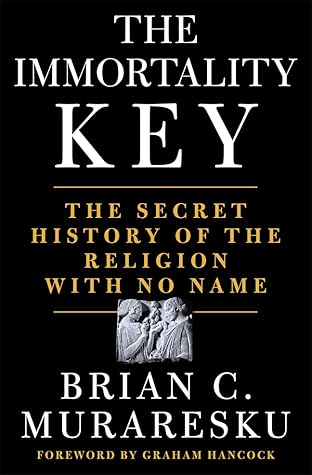More on this book
Community
Kindle Notes & Highlights
Read between
June 5 - June 5, 2022
“Primitive” Christianity, as Brian convincingly argues here, started out around two thousand years ago as merely the latest form or incarnation of this archaic religion, and—at least in some cases—seems to have made use of bread and wine infused with psychedelic plants and fungi as its sacrament.
“Once you’ve plunged into the ocean, does it really matter whether or not you believe in water?”
The entire Qur’an was dictated to Muhammad word for word by the Angel Gabriel, who revealed Islam’s scripture in a series of trances. One of Muhammad’s earliest biographers, Ibn Ishaq, records the belief of family friends that the young prophet suffered a stroke.
the death of each creature is in turn a rehearsal for the death of a species and a galaxy and a cosmos. The great rhythm of going out and returning.
atheists and mystics both essentially believe in nothing. The only difference is that mystics spell it with a capital N.
In the second century AD, the emperor Marcus Aurelius studied in Athens and was later initiated in Eleusis.17 He is reportedly the only lay person ever allowed inside the anaktoron (ἀνάκτορον), the holy of holies housed within the main temple, or telesterion (τελεστήριον).
barley and water mixed with “tender leaves of mint” or blechon (βλήχων).
Hofmann, then seventy-two, had comfortably retired from the Sandoz Laboratories in Switzerland, which is now called Novartis
That potion consists of cheese, barley, honey, and Pramnian wine (a dry, strong wine from the Greek island of Ikaria).
nobody has ever been able to successfully reproduce the alleged psychedelic beverage in the modern-day laboratory.
Greece has long boasted “the earliest farming settlements” in Europe, dating to about 6500 BC.
I’ve been instructed to try the Edelstoff lager.
Pliny credited the appearance of henbane to Hecate’s pet, Cerberus, from whose urine the plant first sprung from the earth. The Greek naturalist referred to the plant as “Herba Apollinaris” (herb of Apollo), claiming that the Pythia priestesses at Delphi inhaled the smoke of smoldering henbane seeds to produce their oracular visions.
The fungus was found embedded between several teeth of a human jawbone. Microscopic evidence of the same organism was additionally identified in one of the miniature chalices that once contained a “special beer.”
There’s a well-known saying that the whole history of western philosophy is just a series of footnotes to Plato.
In his little-known letter Ignatius unambiguously refers to the Eucharist as the “Drug of Immortality” (pharmakon athanasias)—an “antidote” or “remedy” (antidotos) for death, capable of generating eternal life.
wine mixed with black nightshade (Solanum nigrum). Dioscorides specifically characterizes it as psychedelic, saying a decoction of its root taken with wine produces “not unpleasant visions” or phantasias ou aedeis (φαντασίας οὐ ἀηδεῖς).
Every year in the district of Elis on the western Peloponnese, for example, three empty water basins would be sealed up overnight in the Dionysian shrine at the appointed hour.1 As the Greek travel writer Pausanias relates: “in the morning [the priests] are allowed to examine the seals, and on going into the building, they find the pots filled with wine.
the wedding in Cana was said to take place in January, on the same day as the Epiphany miracle on Andros and around the same time as the Lenaia ritual that launched the festival season of Dionysus, John’s Greek speakers may have wondered what was happening behind the scenes.
the ancient city of Scythopolis was the legendary birthplace of Dionysus himself. For that reason it was also called Nysa, providing a coherent solution for the unknown etymology of the wine god’s name: “the god” (Dio) “from Nysa” (Nysus).
A ritual meal was then ingested as part of the “secret rites” engineered to transform Osiris’s earthly representative into the wine god himself. In this supreme act of “mystical conjunction”—drinking the god to become the god—the human king sought to merge with Osiris as the Lord of Death.
the most likely candidates that would have spiked the palatial red wine at Tel Kabri include honey, storax resin (Liquidambar orientalis), terebinth resin (Pistacia palaestina or terebinthus), cyperus roots (Cyperus rotundus), cedar oil (Cedrus libani), juniper berries (Juniperus communis or phoenicea), mint (Mentha), myrtle (Myrtus communis), and cinnamon bark (Cinnamomum).
There’s a reason the crackdown on the Bacchanalia by the Roman senate in 186 BC was the first large-scale religious persecution in European history.46 And there’s a reason Christianity followed suit. In the eyes of the ruling class, the idea of continuity between the Greek and Christian Mysteries was pretty darn clear.
John uses for “flesh” (sarx/σάρξ) and “blood” (haima/αἷμα) are identical to what Euripides wrote in the The Bacchae five hundred years earlier,
the kykeón, a wine-based mixture in which goat cheese, barley flour, and honey were dissolved, to which she added extraordinary phármaka
13 In order to attract the spirits in the underworld, Odysseus is instructed by Circe to offer a few libations: milk and honey, followed by “sweet wine,” followed by water sprinkled with “white barley.”
“Ego eimi he ampelos he alethine,” begins the priest, bouncing the Ancient Greek around the echo chamber: “I am the True Vine.” The Greek word for “vine” is ampelos (ἄμπελος).
But the real kicker was the distinctive medley of opium (Papaver somniferum), cannabis (Cannabis sativa), and two members of the nightshade family, white henbane (Hyoscyamus albus) and black nightshade (Solanum nigrum). The inclusion of the nightshades might as well have been lifted straight from the pages of Dioscorides, who specifically lauded the psychedelic properties of black nightshade with its “not unpleasant visions.” The opium and cannabis, both profoundly mind-altering in high doses, are just icing on the cake. Pushing the bizarre medley even further into witch territory, however,
...more


